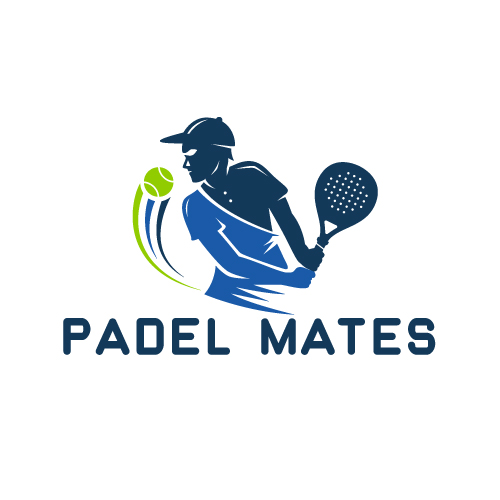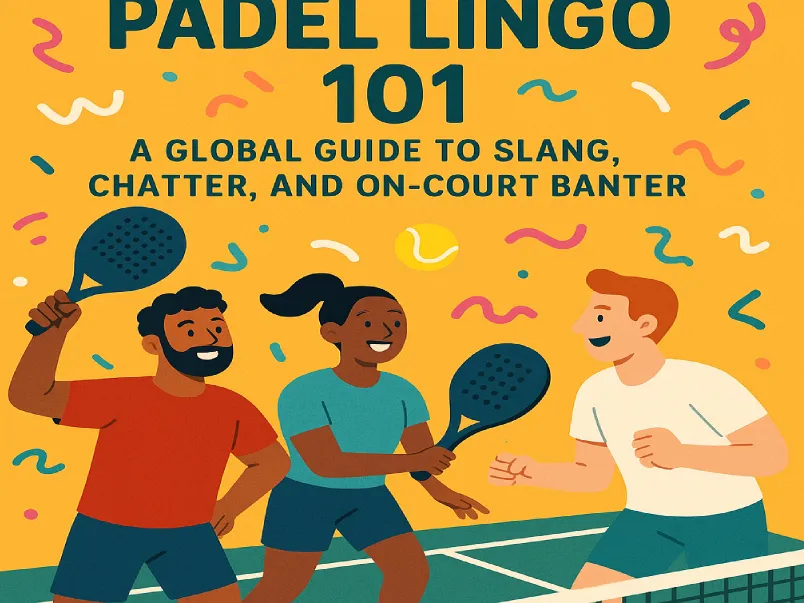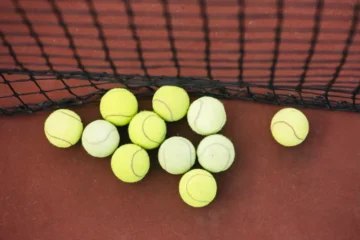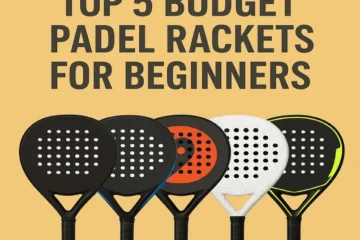More Than Just a Game
If you’ve ever stepped onto a padel court, you’ve probably heard the shout of “¡Vamos!” echo across the court, or witnessed a seemingly random word thrown into a rally that left you scratching your head. Whether it’s in Spain, Mexico, Sweden, or the UAE, padel is a universal language in its own right—yet, the way people speak about it varies wildly.
Just like any sport, padel has developed its own collection of terms, expressions, and slang that reflect the local culture and energy of the players. From the Spanish “bajada” to the Swedish “padelpuck,” the terminology adds flavor to the game and helps create a shared experience among players, regardless of their nationality. As the sport continues to grow, its unique lingo is spreading far and wide.
In this guide, we’ll explore some of the most colorful and entertaining padel slang terms from across the globe. Whether you’re new to the sport or a seasoned player looking to enhance your game with a little local flair, you’ll find that understanding these phrases is key to connecting with padel’s rich and diverse culture.
1. The Heartland: Spanish Slang (The Source)
Introduction: The Foundation of Padel Language
Padel originated in Spain, and its influence on the sport’s language is profound. The Spanish terms used on the court are some of the most widely recognized in the world of padel. Understanding these words can give you insight into the true spirit of the game, whether you’re playing in Madrid, Argentina, or anywhere else.
Essential Vocabulary
- ¡Vamos! – The ultimate cheer that unites all padel players. It’s the shout that rings out before a crucial point, rallying your team and setting the stage for an epic battle. The direct translation is “Let’s go!” but in the padel world, it’s more than just words—it’s a call for action, enthusiasm, and team spirit.
- Chiquita – This refers to a delicate, soft drop shot aimed to surprise your opponent. It’s often played when your opponent is expecting something powerful, making it a sneaky way to win a point. In Spain, it’s more than just a shot—it’s a playful, tactical maneuver.
- Bandeja – A “bandeja” is a defensive shot executed from the back of the court, typically when the ball is high above the player’s head. It’s a controlled and strategic shot that aims to keep the ball in play and force the opponent into a mistake.
- Vibora – The “vibora” or “viper” shot is a fast and aggressive strike that’s usually executed with a sharp spin. It’s one of the most challenging shots in padel, making it a favorite for experienced players who want to overpower their opponent.
- Pared – The wall, or “pared,” is one of the most essential elements of the padel court. It’s not just a physical feature; it’s also part of the strategy. Players use the walls to return balls with impressive angles, making the game more dynamic and unpredictable.
Colorful & Colloquial Terms
- Bajada – This powerful shot is often used to describe a dramatic, smashing move from the back of the court. When you hear someone shout “¡Bajada!” you know the opponent is about to unleash a high-speed attack that’s likely to leave them reeling.
- Culeando – A tricky shot that spins off the wall, often referred to as “snaking” through the air. It’s one of those moves that can leave even the most experienced players scratching their heads.
- Metralleta – A term used for a rapid exchange at the net, this phrase is used when both players are locked in an intense volley that requires lightning-fast reflexes. “Metralleta” translates to “machine gun,” and it perfectly captures the rapid-fire nature of the action.
- ¡Hombre! / ¡Tío! – These are exclamations used to express frustration or excitement, depending on the situation. “¡Hombre!” is often used when something unexpected happens on the court, while “¡Tío!” is more of a casual way to address someone. Both add a touch of local flavor to the game.
2. Latin American Flavor: Regional Twists
Introduction: A Growing Passion Across Latin America
Padel’s popularity is soaring in Latin America, with the sport taking root in countries like Mexico, Argentina, and Brazil. Each nation brings its own flair to the game, and their local slang reflects the unique culture and energy of the region.
Mexico
- Machetear – To “machete” the ball means hitting it with a powerful, chopping motion, usually from a low angle. It’s a forceful move that aims to catch the opponent off guard.
- Golpe de Dios – Translating to “shot from God,” this phrase is used to describe a near-miraculous shot, often one that seems to defy the odds. It’s the type of shot that leaves everyone in awe.
Argentina
- Bife – In Argentina, a “bife” is an error or a mistake on the court. If you miss a shot or make a blunder, don’t be surprised if someone yells out, “¡Qué bife!”
- Dormirla – This term refers to a soft drop shot, literally meaning “put the ball to sleep.” It’s a delicate play, meant to slow down the game and lull your opponent into a false sense of security.
Other Regional Gems
- In Chile, a term like “la pelota fue fuera” (the ball is out) might pop up frequently, while in Uruguay, the phrase “pelotazo” (a big hit) is often heard when someone smashes the ball with power.
3. European Padel Chatter: Beyond Spain
Introduction: Local Twists Across Europe
As padel spreads beyond Spain, neighboring European countries have adopted the sport, adding their own linguistic flavor to the game.
Sweden
- Padelpuck – In Sweden, the ball is often referred to as a “padelpuck,” or “padel puck.” This term reflects a more playful, light-hearted approach to the sport, highlighting Sweden’s love for fun and fitness.
- Cage – The court’s glass and wire mesh structure is often called “cage” in Sweden. The word adds an interesting twist to the game’s technical aspects, as players often play with the idea of using the walls (or cage) as part of their strategy.
Italy
- Pallonetto – In Italy, the lob is referred to as the “pallonetto,” a high-arching shot designed to evade your opponent’s reach. It’s a shot that requires precision and strategy to execute properly.
- Muro – The wall is the same fundamental element in Italy, but it’s called “muro,” which directly translates to “wall.” The term may evoke images of strength and stability, as the wall plays a key role in both offense and defense.
United Kingdom
- Nice One, Squire – The British approach to padel is as polite as you would expect, and terms like “Nice one, squire” are used to compliment a well-executed shot. It’s an expression of appreciation with a touch of old-school charm.
- Let’s have a knock – This phrase is used to invite someone for a casual game of padel. It’s a way to say, “Let’s have a friendly match.”
- Absolute howler – An “absolute howler” is a term used to describe a terrible mistake, typically an unforced error. It’s often said in jest but captures the frustration of a missed shot.
4. Arabic & Middle Eastern Expressions
Introduction: Padel’s Rise in the Middle East
With padel growing rapidly in the UAE, Egypt, and Saudi Arabia, the sport is gaining traction in the Middle East. Arabic expressions are beginning to seep into the language of the game, creating a fascinating blend of local and international culture.
Key Terms
- Yalla! – The Arabic equivalent of “¡Vamos!” It’s a call for action, meant to inspire energy and drive, whether in the middle of a tough rally or when celebrating a well-won point.
- Kwayyis / Mumtaaz – These terms, meaning “good” or “excellent,” are commonly shouted after a great play. Whether you’re acknowledging a fantastic shot or giving credit to a teammate, these words are essential for keeping the energy up.
- Haiti – The term for the wall, “haiti,” is a direct translation of the Spanish “pared.” It’s a crucial feature of the game, and in Arabic-speaking countries, the wall is seen as a tactical tool, just as it is in Spain.
5. The Universal Language: On-Court Gestures & Sounds
Introduction: Communication Without Words
Not all communication on the padel court comes in the form of spoken words. On-court gestures and sounds are just as important in conveying messages and emotions during a match.
Key Gestures & Sounds
- The Raised Hand – This gesture is universally recognized as an apology for a mistake. When a player raises their hand after hitting a bad shot or missing a ball, it’s a way of saying, “Sorry, that was my fault.”
- The Pointing Finger – Used to indicate who is responsible for the ball or point, the pointing finger helps avoid confusion and ensures the game moves smoothly.
- The Tap of the Paddle on the Leg – This gesture is a way of self-admonishing after a poor shot. It’s a subtle but effective way for players to acknowledge their mistake and refocus.
- The “Pfffff” Sound – When a player makes a frustrating mistake, a deep sigh or exhale, often accompanied by a “Pfffff” sound, expresses their displeasure. It’s a universal sound that resonates with players everywhere.
Conclusion: Your Passport to the Padel Tribe
Padel is more than just a sport; it’s a global community united by its love for the game. The slang, gestures, and expressions we use on the court are more than just words—they’re part of what makes the sport so exciting and accessible to players from all corners of the globe.
Next time you step onto the court, try using one of these terms or gestures from another part of the world. Not only will it enrich your experience, but it will also help you feel like a true member of the ever-growing padel tribe. Whether you’re playing in Spain, Argentina, or anywhere else, the language of padel connects us all, reminding us that we’re part of something much larger than just the game itself.
FAQs
1. What is padel slang?
Padel slang refers to the unique set of terms and expressions used by players during a padel game. These words can describe specific shots, strategies, emotions, or situations on the court. The slang varies across regions and countries, adding local flavor to the game and creating a sense of community among players worldwide.
2. How do padel terms differ by region?
Padel terms can differ significantly based on the country or region. For example, in Spain, terms like “¡Vamos!” and “Bandeja” are commonly used, while in Mexico, you might hear “Machetear” to describe a powerful, chopping shot. Each region adds its own unique twist to the language, influenced by local culture and style of play.
3. Can I use padel slang if I’m new to the game?
Absolutely! Using padel slang can enhance your connection to the sport and make the experience more enjoyable. Even if you’re new, it’s fun to pick up some basic terms, like “¡Vamos!” or “Bife,” and use them on the court to join the global padel community.
4. What are some common international padel expressions?
Some popular international padel expressions include “¡Vamos!” (Let’s go!), “Yalla!” (Let’s go in Arabic), and “Padelpuck” (Swedish term for the ball). Each country has its own set of phrases that reflect the unique culture of its padel community.
5. Why is padel slang important in the sport?
Padel slang helps players connect with each other, regardless of their background. It’s a fun, expressive way to communicate and bond with teammates and opponents, making the game more lively and engaging. Understanding these terms also adds to the immersive experience of the sport.




